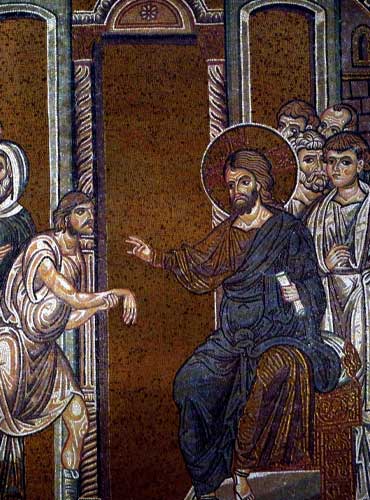Wednesday of the Second Week in Ordinary Time January 22nd 2020, Mk 3:1-16 – (2)
Today’s Gospel presents the Sabbath healing of a man with a withered hand. The whole passage is marked by contrasts between Jesus and the Pharisees.
First, Jesus enters the synagogue, and Mark uses a word that is loaded with significance: figuratively, the word can mean not just to enter, but rather “to enter for an important purpose – in order to experience the result of the Lord’s blessing.” It’s often used for entering into God’s kingdom, entering through the narrow gate, and so on. In other words, Jesus doesn’t go to the synagogue simply to fulfill an obligation: He goes to have a joyful encounter with His Father, to serve and honor Him as He has asked and desires precisely because He loves Him.
We can contrast this with the attitude of the Pharisees, who are clearly up to no good. We can wonder what exactly they were doing in the synagogue in the first place, meaning, if Jesus hadn’t shown up, what would their day at the synagogue been like? Would they have worshipped God with their hearts and souls? Probably not. The Greek word that Mark uses to describe what the Pharisees are doing, παρατηρέω (parateréo), has two meanings: it can mean both to keep a close eye on, but also to scrupulously observe in practice; in other words, it means to observe closely, both in the sense of vision, and in the sense of legal observance or perfectly carrying out of the law. We could say that the close legal observance of the Pharisees actually blinds them, and prevents them from seeing what Jesus is actually doing; their close eye on Jesus is tainted or marred by their legalistic vision of life, or, as Saint Athanasius wrote, “if [the man] was withered in his hand, the ones who stood by were withered in their minds.”
It’s interesting that Christ calls the man to come forward. Mark is silent about where the man was located in the synagogue, but it probably safe to assume he was hidden away, especially if this physical defect (which the Gospel implies he wasn’t born with) was taken to be a sign of the man’s sinfulness. Although we might not think of it, the man’s going to Jesus required faith, and required him to be exposed to the view of all. Again, contrast this with the Pharisees, who see in this sick man only an opportunity to accuse Christ.
To Jesus’s words, the Pharisees “remain silent,” almost involuntarily (in fact, the word can mean that). After all, what could be said when Jesus so clearly shows His mercy?
There is a certain irony that, for the man who believes, Christ is able to restore His withered, or more literally, his dried up hand, but when it comes to dried up hearts, hearts that have hardened into stone, He can only plead, show His Mercy, and wait. Even a hardened hand can’t resist Christ’s power, but a hardened heart can. In this way the Pharisees are even worse off than the man.
There are many lessons we can take away from this, but we can name three to meditate on: first, how do we go about our duties as Christians? Is it with a sense of joy, with the knowledge that no matter what we’re doing, no matter how small or insignificant it is, if we do it with great love, then it is a huge gift given to God? Or do we just go through the motions? Second: how do we observe the members of our community? Saint Augustine has a rather powerful line: he writes: “But men [and women] are hopeless creatures and the less they concentrate on their own sins the more interested they become in the sins of others. They seek to criticize, not to correct. Unable to excuse themselves they are ready to accuse others.” “But men [and women] are hopeless creatures and the less they concentrate on their own sins the more interested they become in the sins of others. They seek to criticize, not to correct. Unable to excuse themselves they are ready to accuse others.” How humble are we in what we notice about others? Is it to help them to grow, or is it to make ourselves feel better about our defects instead of working against them? Lastly, do we take everything, all of our weaknesses and failings, all of our disappointments and sorrows, to Jesus, like the man with the withered hand? Do we have faith in His power to heal anything and everything?
Let us ask, through the intercession of Mary, Mother of All Christians, for the grace to live our lives joyfully, seeking to help others and grow closer to Jesus in all we do.





